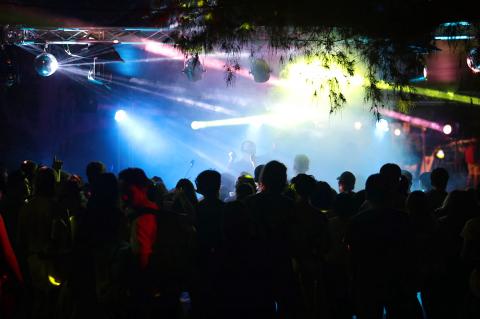Yoga, food, crafts, art, bars, booze, acrobats and, yes, music will all feature as part of Spring Scream (春天吶喊), one of the nation’s oldest and biggest music festivals, which will be held this weekend at Oluanpi Lighthouse National Park (鵝鑾鼻燈塔國家公園), 8km from Kenting.
There will be 150 acts from around the world -- mainly Taiwan, Japan and Korea -- performing on the venue’s five stages. The music will cover the entire gamut of genres including funk, metal, rock ‘n’ roll, punk rock, indie music, hip-hop, DJs, fusion and shoegaze, to name a few.
This year will also feature the Oceansound Yoga Festival, three days of yoga, music, art and food.

Photo courtesy of Spring Scream
The festival offers a shuttle bus service from Kenting to the venue. The bus picks revelers close to the Caesar Hotel and stops at the campground and then the venue.
For Spring Scream participants, the South Point Campground is offering camping for NT$200 per person. The campgrounds are a few minute walk from the Spring Scream site.
There are five campgrounds in the same area that also provide showers and toilets, though organizers say the campgrounds are not affiliated with the event. Be sure to bring your own tent and sleeping bag. The average price per person is between NT$150 and NT$300, though rates go up during holiday weekends.
For a complete lineup of bands and other information, visit the Spring Scream Web site: springscream.com.
■ Tomorrow, Sunday and Monday from noon until midnight
■ Tickets are NT$966 to NT$3,000, available online with KKtix and all Family Mart convenient stores through the FamiPort

The Taipei Times last week reported that the rising share of seniors in the population is reshaping the nation’s housing markets. According to data from the Ministry of the Interior, about 850,000 residences were occupied by elderly people in the first quarter, including 655,000 that housed only one resident. H&B Realty chief researcher Jessica Hsu (徐佳馨), quoted in the article, said that there is rising demand for elderly-friendly housing, including units with elevators, barrier-free layouts and proximity to healthcare services. Hsu and others cited in the article highlighted the changing family residential dynamics, as children no longer live with parents,

It is jarring how differently Taiwan’s politics is portrayed in the international press compared to the local Chinese-language press. Viewed from abroad, Taiwan is seen as a geopolitical hotspot, or “The Most Dangerous Place on Earth,” as the Economist once blazoned across their cover. Meanwhile, tasked with facing down those existential threats, Taiwan’s leaders are dying their hair pink. These include former president Tsai Ing-wen (蔡英文), Vice President Hsiao Bi-khim (蕭美琴) and Kaohsiung Mayor Chen Chi-mai (陳其邁), among others. They are demonstrating what big fans they are of South Korean K-pop sensations Blackpink ahead of their concerts this weekend in Kaohsiung.

Taiwan is one of the world’s greatest per-capita consumers of seafood. Whereas the average human is thought to eat around 20kg of seafood per year, each Taiwanese gets through 27kg to 35kg of ocean delicacies annually, depending on which source you find most credible. Given the ubiquity of dishes like oyster omelet (蚵仔煎) and milkfish soup (虱目魚湯), the higher estimate may well be correct. By global standards, let alone local consumption patterns, I’m not much of a seafood fan. It’s not just a matter of taste, although that’s part of it. What I’ve read about the environmental impact of the

Oct 20 to Oct 26 After a day of fighting, the Japanese Army’s Second Division was resting when a curious delegation of two Scotsmen and 19 Taiwanese approached their camp. It was Oct. 20, 1895, and the troops had reached Taiye Village (太爺庄) in today’s Hunei District (湖內), Kaohsiung, just 10km away from their final target of Tainan. Led by Presbyterian missionaries Thomas Barclay and Duncan Ferguson, the group informed the Japanese that resistance leader Liu Yung-fu (劉永福) had fled to China the previous night, leaving his Black Flag Army fighters behind and the city in chaos. On behalf of the